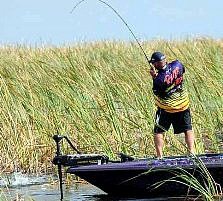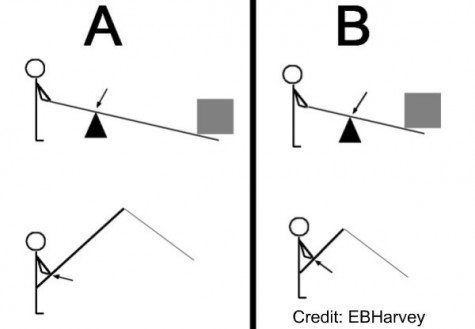This one is a pet peeve of mine. And yes, it might just be a semantics argument, but I’ve got to rant anyway.
Check out the catalogs, read an article or listen to an interview with a pro angler, and the first advantage they’ll mention when discussing their 7′ plus rods is how they get more leverage with them. Even read it just last week right here on Bass Parade.
But, ummm, not exactly.
So this is where the semantics come in. According to most dictionaries, the definition of leverage for our use is “the mechanical advantage gained by employing a lever“. A fishing rod is just a form of lever, in actuality, a class 3 lever. Most people think of a lever as something that makes your life easier by multiplying force, that is, they have a mechanical advantage greater than 1. Ties in with the defnition. Big long rod, yank those bass right up out of the thick stuff.
But a class 3 lever always has a mechanical advantage of less than 1. That means it requires more effort on the part of the angler, not less, to accomplish the same work. Check out this diagram to see what I mean, and tell me which scenario offers the easier input effort.
It’s the same principle and reason why saltwater anglers use short (<5′) stand-up rods when battling giant fish they’re trying to dredge up off the ocean floor – greater leverage. Which then begs the question, if not more leverage, then why use them?
Although they boost the amount of effort needed, class 3 levers are useful for increasing the speed at which a load is moved. It’s also a sacrifice of power for a gain in ability. Long rods make for longer casts. Long rods let you move more line on a hookset, faster. By being able to move more line faster, you can keep better and more consistent pressure on a fish. Long rods cushion the pressure on your fishing line by distributing the force over a greater distance and number of guides – less breakoffs. And yes, by moving more line, you can move a fish a longer distance when you yank on him…but it’s just going to take more effort on your part than if you were using a shorter rod.



























JP
April 16, 2012 at 8:25 am
I think its just a misuse of the word or something. i think it is far easier to set the hook on a 7′ than a 6’6″
Wacko
April 16, 2012 at 8:39 am
Hey man we’re just dumb old fishermen. Don’t be pulling out the physics lessons on us pet peeve or not.
We like effort.
You want to make it even harder try jerking one out of the hydrilla using a 8′ rod without swallowing your tobacco juice.
That’s effort. Don’t ask me how I know.
BryanT
April 16, 2012 at 9:31 am
I’ve used the standup rod leverage story on tons of guys with long rods. Although the actual leverage is higher with a shorter rod, it makes no difference when your personal ability to move a weight(the fish) is much greater than the weight itself. It shrinks the difference in leverage, it shrinks the difference in the mechanical advantage. Why it helps so much with the tuna rods is the weight of the quarry. So since leverage is a myth and what you are really using it for is faster line uptake, and maneuverability of the fish. Not leverage.
Plus they are cool, I love my 8′ crank’n stick, thing will cast a mile….which brings me to thinking maybe you’re next physics article can be on potential energy vs kinetic and why glass rods actually can store more energy due to its slower action and create longer casts.
MattBass
April 16, 2012 at 9:47 am
Great piece!
The amount of Bull-Butter that’s foisted onto gullible Bassers is unbelievable.
(I have a Ph.D. In science – however, 99% of this junk doesn’t even pass a high-school science-class level of understanding.)
OTOH, I have gone to almost all rods between 6’6″ and 7’6″.
I won’t rehash all the true advantages vs. the disadvantages. I WILL give you one more bit of physics: I’m 6’3″ and weigh ~200 lb standing on solid footing (which allows maximum application of that elusive leverage); the largest bass I’ve ever caught was 2’3″ and weighed ~ 12.5 lb swimming in a liquid (which dramatically reduces her ability to apply any leverage).
I’ll stay with the longer rod – I like my chances.
Micropterously yours,
Matt
Flip'N'Pitch
April 16, 2012 at 12:15 pm
Oooh, another nice thought provoking topic! It may not be that simple. Some random musings before further research: the placement and action of your wrists are different when casting than when reeling in so wouldn’t the class of lever be different in each situation?, Archimedes would probably scoff if he saw a modern fishing rod and heard us label it as a lever (levers ideally absorb/store no energy so they can transfer it instead), when casting a rod it’s almost more like a whip than a lever but since a rod made of re-bar wouldn’t cast very well we’re forced to make do on the flip side of reeling fish in, I humbly suggest the short saltwater rods are designed thusly because casting distance and accuracy aren’t really critical compared to maximizing leverage
Flip'N'Pitch
April 16, 2012 at 12:26 pm
…so they use more rigid (usually heavier) materials which culminates in a shorter rod due to weight, cost, etc. I don’t think a 5′ rod of the same material construction as a 10′ rod provides more leverage. Rather, it’s just after a certain point the ability of the human wrist to act as the necessary fulcrum is exceeded.
Flip'N'Pitch
April 16, 2012 at 1:10 pm
Also, since the rod tip flexes shouldn’t that be the fulcrum instead of your wrists? In that case, a longer rod would indeed provide more leverage.
MattBass
April 16, 2012 at 5:48 pm
You just brought back a memory from WAY back: as a kid, my dad had a tubular steel fishing rod!
Flip'N'Pitch
April 16, 2012 at 6:07 pm
Awesome! Now that’s even more “pool cue” than a pool cue! Did he use a logging chain for his main line and steel cable for his leader?!?! 😉
Mellis
April 18, 2012 at 9:24 pm
The physics dictate that the longer rods require more force to do the same work but how MUCH more force? Is it a significant amount worth making the change to sub 7′ rods?
Texaginian
April 19, 2012 at 9:42 am
My favorite rod for bass fishing is my 5’9″ Shimano Compre (spinning). My second favorite is my 6″3″ Compre.
I HATE that most of the “quality brands” are moving toward 6’10” and up and dropping the shorter variety.